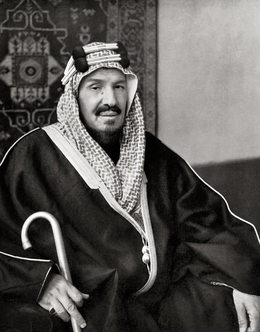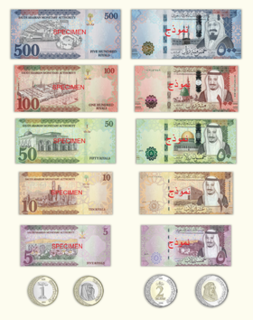
The Arabian Peninsula or simply Arabia, is a peninsula of Western Asia situated northeast of Africa on the Arabian plate.

Wahhabism is an Islamic doctrine and religious movement founded by Muhammad ibn Abd al-Wahhab. It has been variously described as "ultraconservative", "far-right" "austere", "fundamentalist", or "puritan(ical)"; as an Islamic "reform movement" to restore "pure monotheistic worship" (tawhid) by devotees; and as a "deviant sectarian movement", "vile sect" and a distortion of Islam by its detractors. The term Wahhabi(sm) is often used polemically and adherents commonly reject its use, preferring to be called Salafi or muwahhid, claiming to emphasize the principle of tawhid or monotheism, dismissing other Muslims as practising shirk (idolatry). It follows the theology of Ibn Taymiyyah and the Hanbali school of jurisprudence, although Hanbali leaders renounced ibn Abd al-Wahhab's views.

Abdulaziz ibn Abdul Rahman ibn Faisal ibn Turki ibn Abdullah ibn Muhammad Al Saud, known in the West as Ibn Saud, was the first monarch and founder of Saudi Arabia, the "third Saudi state".

Saudi Arabia, officially the Kingdom of Saudi Arabia, is a country in Western Asia constituting the bulk of the Arabian Peninsula. With a land area of approximately 2,150,000 km2 (830,000 sq mi), Saudi Arabia is geographically the largest sovereign state in Western Asia, the second-largest in the Arab world, the fifth-largest in Asia, and the 12th-largest in the world. Saudi Arabia is bordered by Jordan and Iraq to the north, Kuwait to the northeast, Qatar, Bahrain, and the United Arab Emirates to the east, Oman to the southeast and Yemen to the south; it is separated from Egypt and Israel by the Gulf of Aqaba. It is the only country with both a Red Sea coast and a Persian Gulf coast, and most of its terrain consists of arid desert, lowland and mountains. As of October 2018, the Saudi economy was the largest in the Middle East and the 18th largest in the world. Saudi Arabia also has one of the world's youngest populations: 50 percent of its 33.4 million people are under 25 years old.

In J. R. R. Tolkien's fantasy legendarium, Harad is the immense land south of Gondor and Mordor. Its main port is Umbar, the base of the Corsairs of Umbar whose ships serve as the Dark Lord Sauron's fleet. Its people are the dark-skinned Haradrim or Southrons; their warriors wear scarlet and gold, and are armed with swords and round shields; some ride gigantic elephants called mûmakil.

The Saudi riyal ; is the currency of Saudi Arabia. It is abbreviated as ر.س or SAR (Saudi Arabian Riyal). It is subdivided into 100 halalas.

The Saudi–Yemen barrier is a physical barrier constructed by Saudi Arabia along part of its 1,800-kilometer (1,100 mi) border with Yemen. It is a structure made of pipeline three metres (10 ft) high filled with concrete, acting as a "security barrier along sections of the now fully demarcated border with Yemen" and fitted with electronic detection equipment.
The Saudi Arabia national football team represents Saudi Arabia in men's international football and The team's colours are green and white. Saudi Arabia are known as Al-Suqour and Al-Akhdhar, The team represents both FIFA and Asian Football Confederation (AFC).

Salman bin Abdulaziz Al Saud has been the king and prime minister of Saudi Arabia and custodian of the Two Holy Mosques since 23 January 2015.

Articles related to Saudi Arabia include:

Saudi Arabia–United States relations refers to the bilateral relations between the Kingdom of Saudi Arabia and the United States of America, which began in 1933 when full diplomatic relations were established and became formalized in the 1951 Mutual Defense Assistance Agreement. Despite the differences between the two countries—an ultraconservative Islamic absolute monarchy, and a secular, constitutional republic—the two countries have been allies. Former Presidents George W. Bush and Barack Obama have close and strong relations with senior members of the Saudi Royal Family.

The Saudi Arabian Air Defense Forces or officially Royal Saudi Air Defense Forces (RSADF) is the aerial defense service branch of the Saudi Arabian Armed Forces. It is fourth of the five service branches of the MOD. It has its HQ in Riyadh, where there is also an elaborate underground command facility that co-ordinates Arabian Kingdom's advanced "Peace Shield" radar and air defense system, with an estimated 40,000 active duty military personnel in 2015.
Capital punishment is a legal penalty in Saudi Arabia. The country performed at least 158 executions in 2015, at least 154 in 2016, at least 146 in 2017, at least 149 in 2018, with possibly 184 executed in 2019.

In 2013, the number of crime cases reported by the Ministry of Justice was 22,113, a 102% increase over 2012.

The legal system of Saudi Arabia is based on Sharia, Islamic law derived from the Qur'an and the Sunnah of the Islamic prophet Muhammad. The sources of Sharia also include Islamic scholarly consensus developed after Muhammad's death. Its interpretation by judges in Saudi Arabia is influenced by the medieval texts of the literalist Hanbali school of Islamic jurisprudence. Uniquely in the Muslim world, Sharia has been adopted by Saudi Arabia in an uncodified form. This, and the lack of judicial precedent, has resulted in considerable uncertainty in the scope and content of the country's laws. The government therefore announced its intention to codify Sharia in 2010, and significant progress has been made with the publication, on January 3, 2018, of a sourcebook of legal principles and precedents. Sharia has also been supplemented by regulations issued by royal decree covering modern issues such as intellectual property and corporate law. Nevertheless, Sharia remains the primary source of law, especially in areas such as criminal, family, commercial and contract law, and the Qur'an and the Sunnah are declared to be the country's constitution. In the areas of land and energy law the extensive proprietorial rights of the Saudi state constitute a significant feature.
Saudis or Saudi Arabians are a nation composed mainly of Arab ethnic groups who are native to the Arabian Peninsula and live in the five historical Regions: Najd, Al-Hijaz, Asir, Tihama and Al-Ahsa; the regions which Kingdom of Saudi Arabia was founded on or what was formerly known as the Kingdom of Hejaz and Nejd in the Arabian Peninsula. Saudis speak one of the accents and dialects of the Peninsular Arabic, including the Hejazi, Najdi, Gulf and Southern Arabic dialects, as a mother tongue. According to the 2010 A.D.census, Saudi nationals represented approximately 19,335,377 making up 74.1% of the total population. Saudi Arabia is a state governed by absolute monarchy, with the king as its head of state. The word Saudis refer to the name of the ruling family in the Kingdom of Saudi Arabia today as an inclusive name for the people of the five regions:.
Television in Saudi Arabia was introduced in 1954, however, dominated by just five major companies: Dubai TV, Middle East Broadcasting Center,SM Enterprise TV, Lebanese Broadcasting Corporation, Rotana and Saudi TV. Together, they control 80% of the pan-Arabee ENJ broadcasting market. Though private television stations cannot operate from Saudi soil, the country is a major market for pan-Arab satellite and pay-TV. Saudi investors are behind the major networks MBC, which is based in Dubai, and Emirates based OSN. Although satellite dishes have been officially banned since 1990, Saudi Arabia has the second highest satellite TV penetration in the Arab Region, at 97%, and there are 85 free-to-air satellite channels headquartered in Saudi Arabia.

Visitors to Saudi Arabia must obtain a visa unless they come from one of the visa exempt countries. Some visitors are eligible to obtain a visa online or on arrival while others needs to apply at one of the Saudi diplomatic missions in advance.
The Battle of Port Midi refers to a battle during the Yemeni Civil War between the Saudi coalition backed Hadi loyalists and the Houthi government. Although Hadi loyalists seized the port, the Houthi fighters along with the popular committees managed to conduct some attacks around Midi. The conflict also had spillovers in the rest of the Hajjah Governorate. On 26 January 2017, Hadi loyalists extended their control to Harad District in Hajjah Governorate.
On March 2, 2020, the Saudi Arabian Ministry of Health confirmed the first case of the COVID-19 disease caused by the SARS-CoV-2 virus in the kingdom. On April 8, as many as 150 members of the Saudi royal family had tested positive. The king's nephew, Faisal bin Bandar Al Saud, has been put in the intensive care unit at an elite hospital over coronavirus complications. As of April 10, 2020, the kingdom had 3,651 confirmed cases, the highest of the states of the Arabian Gulf, with 685 recoveries and 47 deaths.












